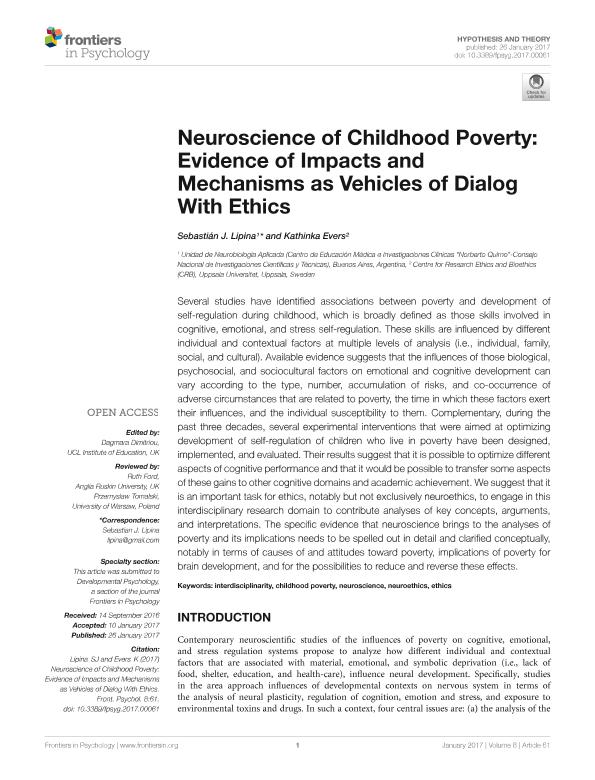Artículo
Neuroscience of childhood poverty: Evidence of impacts and mechanisms as vehicles of dialog with ethics
Fecha de publicación:
01/2017
Editorial:
Frontiers Research Foundation
Revista:
Frontiers in Psychology
ISSN:
1664-1078
Idioma:
Inglés
Tipo de recurso:
Artículo publicado
Clasificación temática:
Resumen
Several studies have identified associations between poverty and development of self-regulation during childhood, which is broadly defined as those skills involved in cognitive, emotional, and stress self-regulation. These skills are influenced by different individual and contextual factors at multiple levels of analysis (i.e., individual, family, social, and cultural). Available evidence suggests that the influences of those biological, psychosocial, and sociocultural factors on emotional and cognitive development can vary according to the type, number, accumulation of risks, and co-occurrence of adverse circumstances that are related to poverty, the time in which these factors exert their influences, and the individual susceptibility to them. Complementary, during the past three decades, several experimental interventions that were aimed at optimizing development of self-regulation of children who live in poverty have been designed, implemented, and evaluated. Their results suggest that it is possible to optimize different aspects of cognitive performance and that it would be possible to transfer some aspects of these gains to other cognitive domains and academic achievement. We suggest that it is an important task for ethics, notably but not exclusively neuroethics, to engage in this interdisciplinary research domain to contribute analyses of key concepts, arguments, and interpretations. The specific evidence that neuroscience brings to the analyses of poverty and its implications needs to be spelled out in detail and clarified conceptually, notably in terms of causes of and attitudes toward poverty, implications of poverty for brain development, and for the possibilities to reduce and reverse these effects.
Palabras clave:
Childhood Poverty
,
Ethics
,
Interdisciplinarity
,
Neuroethics
,
Neuroscience
Archivos asociados
Licencia
Identificadores
Colecciones
Articulos(CEMIC-CONICET)
Articulos de CENTRO DE EDUCACION MEDICA E INVESTIGACIONES CLINICAS "NORBERTO QUIRNO"
Articulos de CENTRO DE EDUCACION MEDICA E INVESTIGACIONES CLINICAS "NORBERTO QUIRNO"
Citación
Lipina, Sebastián Javier; Evers, Kathinka; Neuroscience of childhood poverty: Evidence of impacts and mechanisms as vehicles of dialog with ethics; Frontiers Research Foundation; Frontiers in Psychology; 8; 61; 1-2017; 1-13
Compartir
Altmétricas




